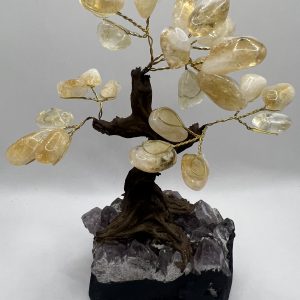
Citrine
Formation
Citrine is a variety of quartz that is formed by the exposure of amethyst to heat and pressure. The formation of citrine occurs when amethyst, another variety of quartz, is exposed to high temperatures, either naturally or through artificial means.
Natural citrine is relatively rare, and most of the citrine available on the market is actually heat-treated amethyst. This process involves heating the amethyst to high temperatures, usually between 470 and 560 degrees Celsius, for several hours. The heat causes the iron in the crystal lattice to break down and disperse, resulting in the characteristic yellow color of citrine.
Some citrine is also formed through a process known as irradiation, in which amethyst is exposed to gamma radiation. This process can produce citrine with a more intense yellow color than heat-treated citrine.
Overall, the formation of citrine involves the transformation of amethyst through exposure to heat and/or radiation. The resulting crystal is highly valued for its beauty and spiritual and healing properties.
Uses
Citrine is a popular gemstone and is often used in jewelry, decorative objects, and spiritual practices. Here are some of the most common uses of citrine:
- Jewelry: Citrine is a popular gemstone for jewelry, especially in rings, necklaces, and bracelets. Its warm yellow color makes it a versatile and eye-catching choice for both casual and formal wear.
- Decorative objects: Citrine is also used in decorative objects such as figurines, vases, and candle holders. Its warm and vibrant color makes it a popular choice for adding a touch of elegance and warmth to a space.
- Feng shui: Citrine is often used in feng shui practices to attract wealth, success, and abundance. It is believed to promote positive energy and help clear blockages that may be preventing prosperity and abundance.
- Spiritual practices: Citrine is also used in spiritual practices such as crystal healing and meditation. It is believed to promote mental clarity, enhance creativity, and release negative energy and emotions.
- Alternative healing practices: Citrine is sometimes used in alternative healing practices such as Reiki and acupuncture. It is believed to have a range of physical healing properties, including aiding in digestion, boosting the immune system, and promoting healthy skin and hair.
Overall, citrine is a versatile and widely used crystal that is valued for its beauty, spiritual properties, and healing properties. Whether used in jewelry, decorative objects, or spiritual practices, it is a popular choice among many people around the world.
Healing Properties
Citrine is believed to have a range of physical and emotional healing properties. Here are some of the most commonly associated healing properties of citrine:
- Digestion: Citrine is believed to aid in digestion and help with issues such as nausea, bloating, and constipation. It is said to stimulate the digestive system and promote the absorption of nutrients.
- Immune system: Citrine is believed to boost the immune system and promote overall health and vitality. It is said to help fight off infections and illnesses and to promote a strong and healthy body.
- Skin and hair: Citrine is believed to promote healthy skin and hair. It is said to help with issues such as acne, eczema, and hair loss, and to promote a healthy and radiant complexion and shiny hair.
- Self-confidence: Citrine is believed to promote self-confidence and self-esteem. It is said to help overcome fears and doubts and to promote a positive and confident attitude.
- Emotional balance: Citrine is also believed to promote emotional balance and well-being. It is said to help release negative emotions such as anger and fear, and to promote a sense of inner peace and calm.
Overall, citrine is believed to have a range of physical and emotional healing properties, making it a popular choice among those who practice alternative healing and natural medicine. However, it's important to note that these beliefs have not been scientifically proven, and citrine should not be used as a substitute for medical treatment or advice from a qualified healthcare professional.



